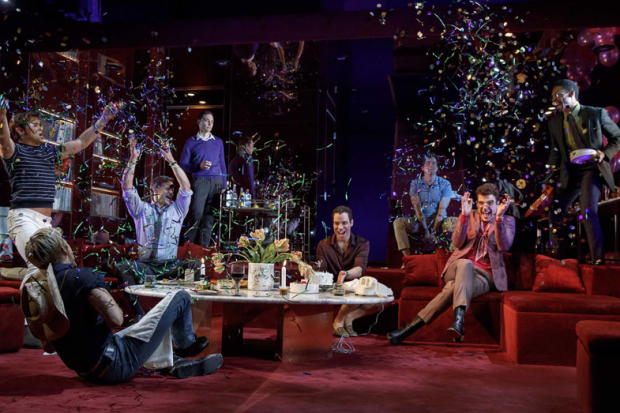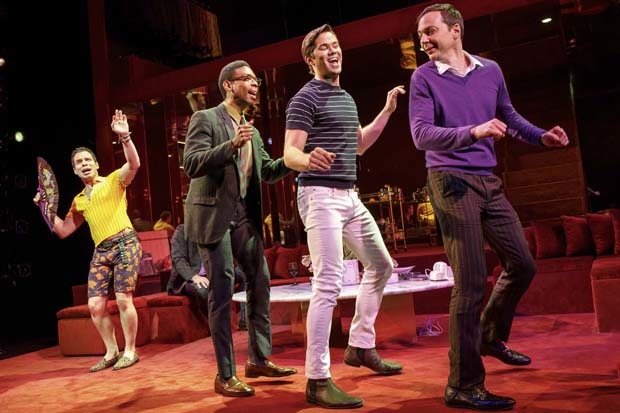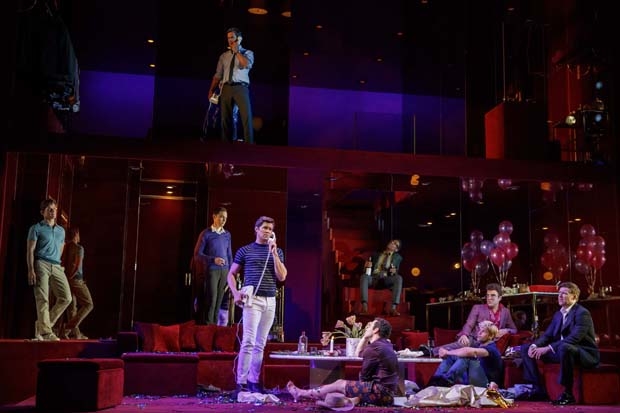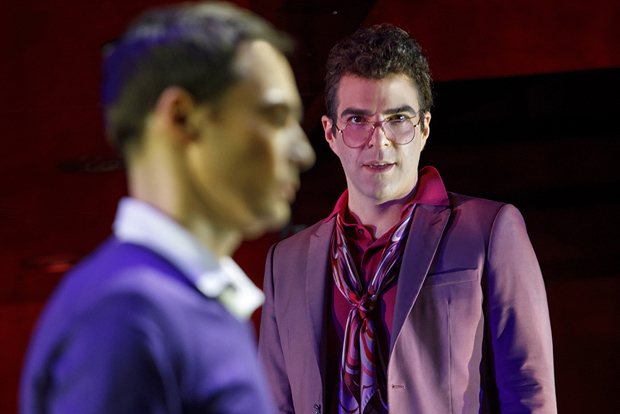The Fundamental Americanness of The Boys in the Band
Fifty years since first coming out of the closet, Mart Crowley’s groundbreaking gay play finally bows on Broadway.

(© Joan Marcus)
"If we could just learn not to hate ourselves quite so very much," laments the protagonist of Mart Crowley's The Boys in the Band, the 1968 off-Broadway debut of which made straight audiences hip to the daily misery endured by gay Americans. Fifty years later, the play is finally making its Broadway debut at the Booth Theatre with a star-studded production. The benefit of hindsight allows us to see that the misery Crowley diagnosed is no longer an exclusively homosexual affliction — and probably never was.
Outwardly, the story is très gay: Michael (Jim Parsons) is throwing a birthday party for Harold (Zachary Quinto) that will be attended by "the same old tired fairies you've seen around since the day one." That includes working-class bookworm Donald (Matt Bomer), screaming queen Emory (the hilarious, impossibly fierce Robin De Jesús), and their one black friend, Bernard (Michael Benjamin Washington). Semi-closeted schoolteacher Hank (Tuc Watkins) arrives with his lover, Larry (Andrew Rannells), although Larry insists that theirs is not an exclusive arrangement. The party receives two surprise guests: Michael's ostensibly straight college buddy Alan (Brian Hutchison) and a muscle-bound rent boy (a gift from Emory to Harold) simply referred to as Cowboy (Charlie Carver). Michael takes one glance and remarks, "He looks right out of a bus and truck tour of Oklahoma!" Such little digs represent the evening's entertainment, a favorite gay pastime that a subsequent generation of queers would rebrand as "throwing shade." It's all good fun, until someone loses his dignity.

(© Joan Marcus)
As he did in The Humans, director Joe Mantello excels at illuminating the subtle group dynamics of a party, in which stolen glances and stealthy exits are as significant as the dialogue. He doesn't neglect Crowley's language, though, which sounds as crisp as ever in the mouths of this excellent cast. Parsons endows Michael (a mean drunk recently on the wagon) with the deadly combination of implacable sadness and a sharp tongue. He's Jan Brady to Harold's Marsha, and the play really gets exciting when they spar. In contrast to Parsons's tightly wound demeanor, Quinto affects an exaggerated cool. A latter-day Byzantine empress, he reclines on a sofa to swill red wine and deliver his lines in the voice of Gore Vidal. It's no surprise that Harold (the only Jewish character) sports the most prodigious WASP accent of the night. Half a century before Crowley, George Bernard Shaw taught us that speech is an aspirational affectation. Everyone in this play is aspiring to be something they're not, or have something they cannot.
There's a myopic school of thought that has deemed this play irrelevant, a relic of the homosexual dark ages. But being able to marry and join the military hasn't nearly alleviated all the inequalities facing gay Americans, nor has it prevented frequent acts of antigay violence, making sections of the play uncomfortably pertinent.

(© Joan Marcus)
The Boys in the Band finds its greatest resonance in its shrewd depiction of less spectacular dysfunction: "Just because I wear expensive clothes doesn't necessarily mean they're paid for," Michael admits, speaking not just for the vast majority of gay men in 2018, but the vast majority of Americans who attempt to fill the void with stuff. In many ways, this sickness is worse today than it was in 1968, now that credit cards are readily available and social media "feeds" keep our feelings of deficiency stoked with every update. Broadway is not above exploiting such feelings in its promotion, like this fashion spread that manages to make gay self-loathing look terribly chic and inaccessibly expensive.
Perhaps it is that aura of capitalist exclusivity that has driven set designer David Zinn to fashion Michael's duplex apartment as if it were the VIP lounge of a nightclub. The walls are glass and mirror, with hideous russet sofas that match the carpet (seemingly selected to mask red wine stains). It's hard to believe anyone actually lives in this tacky nightmare, even someone with as much to prove as Michael. Zinn's costumes are more successful, bridging the last half-century with subtly retro duds that wouldn't look out of place in the Hell's Kitchen of today. Only Quinto, with his rose-tinted glasses and scarf dangling over a pink blouse, looks like he's in a costume drama. Mantello superfluously uses light (by Hugh Vanstone) and sound (by Leon Rothenberg) to freeze time and underline key moments, like when Michael succumbs to his first drink. But The Boys in the Band is not a cautionary tale about the consequences of our short-term choices. Like all great tragedies, Michael's fate is written in the stars before the play even begins.

(© Joan Marcus)
Harold knows this when he finally cuts Michael down in the middle of his psychological massacre of his friends, an externalization of his own self-hatred. "You will always be homosexual," he tells him, "always, Michael. Always." It's a line that rings particularly true in 2018, against the underscoring of each increasingly desperate refrain of "love wins." Even if we finally overcome our internalized homophobia, we still have the monster of nagging inadequacy to tear at our souls. That's not a defect of American life, but a feature — and it will take far longer than 50 years to slay.








